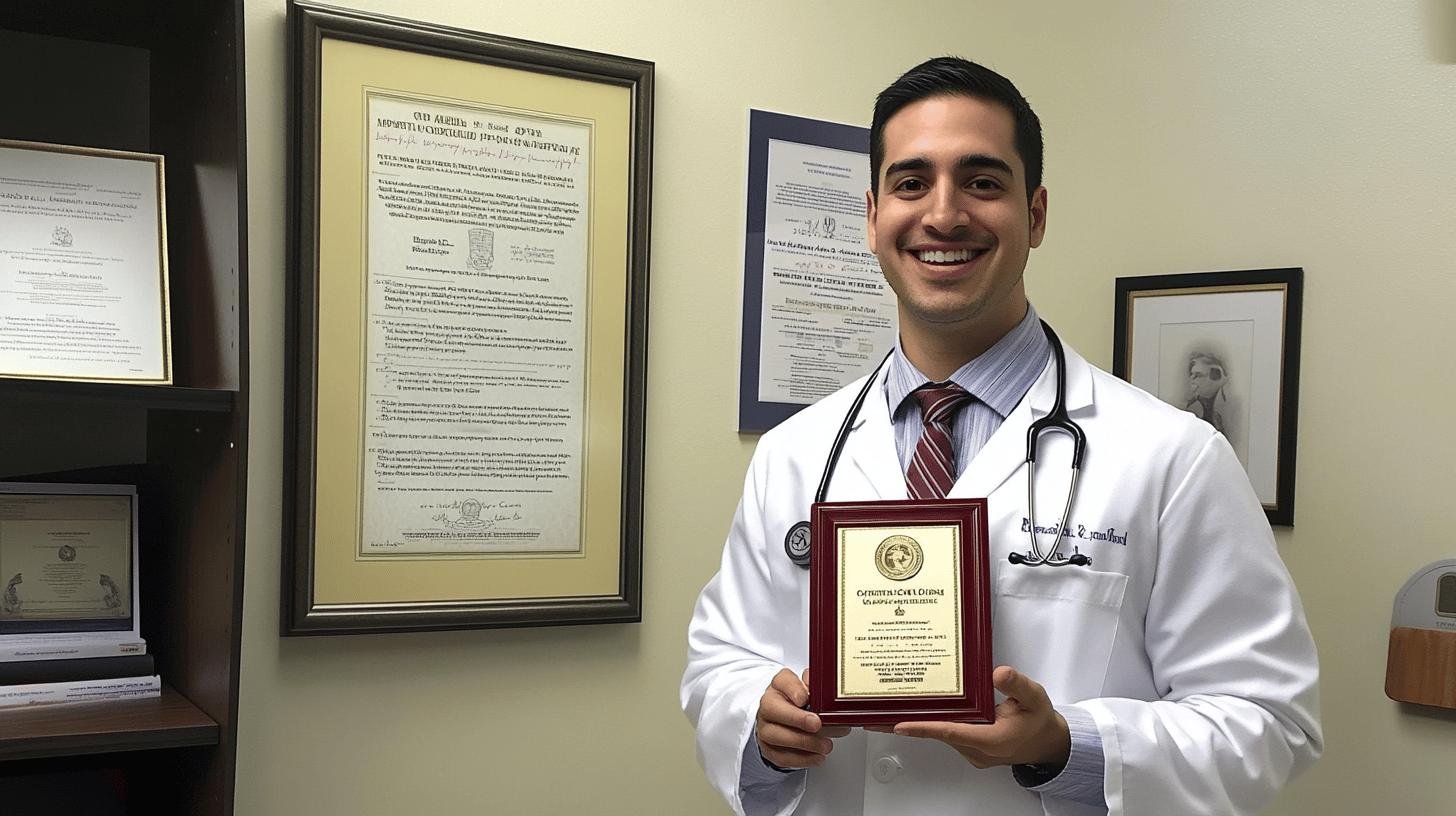TL;DR:
- An obesity management specialist helps address obesity through personalized treatment plans.
- They collaborate with dietitians, exercise physiologists, behavioral therapists, nurses, and pharmacists.
- Specialists require a medical degree and certification from the American Board of Obesity Medicine (ABOM).
- Treatment strategies include dietary interventions, structured exercise programs, and medical/surgical options.
- Choose a specialist based on experience, success stories, patient reviews, and multidisciplinary approaches.
- Resources for finding specialists include the Obesity Medicine Association directory and the American Board of Obesity Medicine listings.
Ever found yourself struggling in the endless cycle of weight loss and regain? You’re not alone! Managing obesity isn’t just about shedding pounds; it’s about creating a sustainable lifestyle. Enter the obesity management specialist—a healthcare professional with expertise beyond simple diet and exercise plans. They’re like your personal health coach, offering tailored strategies and support. Whether it’s teaming up with dietitians or navigating surgical options, these specialists craft comprehensive plans to help you succeed. Ready to explore personalized care that’s built for long-lasting results? Let’s dive into how these experts do it!
Understanding the Role of an Obesity Management Specialist
An obesity management specialist is a healthcare professional focused on helping people address obesity. They act as personal coaches for weight management, using diet plans, exercise routines, medications, and sometimes surgery. These specialists work within teams to create personalized treatment plans for individual needs. Their guidance makes obesity management more structured and less about guesswork.
They often collaborate with:
- Dietitians: Plan meals that are nutritious and satisfying.
- Exercise Physiologists: Tailor exercise programs to fit lifestyles.
- Behavioral Therapists: Address the mental aspect of weight management.
- Nurses: Monitor progress and assist with medical care.
- Pharmacists: Ensure medications are used safely and effectively.
Why are these specialists important? Obesity is more than a number on the scale; it can lead to other health issues, like diabetes and heart disease. Obesity management specialists address these risks with targeted care, focusing on both weight and overall health. They explore each patient’s life to understand habits, challenges, and goals, promoting a collaborative journey towards better health.
How do they differ from regular healthcare providers? General practitioners handle broad health issues, while obesity management specialists offer focused expertise. It’s like comparing a general handyman to a master carpenter. If you’re serious about tackling obesity, these specialists are invaluable.
Qualifications and Credentials of an Obesity Management Specialist

What does it take to become an obesity management specialist? They often start with a medical degree and then pursue additional training in obesity medicine or endocrinology. Certification by the American Board of Obesity Medicine (ABOM) proves they’ve deeply studied obesity management. It’s like gaining advanced skills to handle obesity challenges.
Why do these credentials matter? Obesity is complex, affecting the heart, joints, and more. A board-certified specialist offers informed, nuanced care. As the field grows, more specialists gain certification, expanding the expertise available to you. These professionals provide specialized knowledge, ensuring effective and cutting-edge care.
Strategies and Treatment Modalities Used by Obesity Management Specialists
Obesity management specialists have a range of strategies for weight management. Their approach includes personalized plans that fit individual needs, from dietary changes to surgical options. Let’s explore the treatment methods they might use.
Dietary and Nutritional Interventions
Specialists create diet plans that focus on more than just cutting calories. They also make sure meals are enjoyable. Nutritional counseling is key, guiding you in understanding your body’s necessities. It’s like having a personal guide to aligning your food choices with your health goals.
Exercise and Physical Activity
Obesity specialists design exercise programs that suit your preferences and physical abilities. Whether you prefer walking, swimming, or other activities, they ensure exercise fits seamlessly into your life. Regular movement is crucial, and these specialists make it achievable and enjoyable.
Medical and Surgical Interventions
Sometimes, diet and exercise need additional support. Medications and pharmacotherapy can be crucial for managing weight. Bariatric surgery is another option when necessary. Specialists help patients understand these possibilities, ensuring they know the risks and benefits. It’s about finding the right balance for long-lasting health improvements.
| Treatment Modality | Description |
|——————————-|——————————————————————————|
| Dietary and Nutritional | Personalized diet plans and nutritional counseling tailored to individual needs. |
| Exercise and Physical Activity| Structured exercise programs and activity recommendations for sustainable fitness. |
| Medical and Surgical | Use of medications, pharmacotherapy, and bariatric surgery for comprehensive care. |
Understanding these obesity treatment strategies equips you to tackle obesity confidently. Which strategy do you think suits you best?
Choosing the Right Obesity Management Specialist for You

Finding the right obesity management specialist is like picking the perfect pair of shoes—they must fit well! Each patient has unique needs, so select a specialist who aligns with your health goals and preferences. Experience and a proven track record make a significant difference. Look for success stories and patient reviews to understand their approach.
Specialists affiliated with reputable healthcare institutions often have more resources and support systems. Multidisciplinary teams are beneficial, bringing together various experts to address obesity from all angles.
Consider these factors when selecting your specialist:
- Experience: Seek specialists who’ve honed their skills in obesity management over the years.
- Success Stories: Testimonials reveal potential outcomes.
- Patient Reviews: Honest feedback helps gauge satisfaction and effectiveness.
- Multidisciplinary Approach: Teams, including dietitians, exercise physiologists, and therapists, offer comprehensive care.
- Affiliation: Connections with top healthcare institutions signal quality and reliability.
A patient-centered approach is key to successful obesity management. Specialists focused on individualized care plans ensure treatment matches your needs. This approach fosters collaboration where you feel heard and supported. With ongoing support systems, you’re a partner in your healthcare journey. These systems keep you motivated, smoothing your path to better health. How do you feel about teaming up with a specialist who has your back?
Success Stories and Patient Experiences with Obesity Management Specialists
Patient experiences are like golden insights into obesity management, showing how specialists impact lives. They highlight why patient education and support are crucial. Stories from those who’ve been through it demonstrate the power of tailored care plans and supportive specialists. It’s about gaining health and a positive mindset, not just losing weight. These narratives emphasize personalized care that keeps patients motivated.
Here are some common outcomes in success stories:
- Improved Health Metrics: Lower blood pressure, cholesterol, and blood sugar levels.
- Enhanced Quality of Life: Increased energy and better mobility.
- Sustained Weight Loss: Long-term ability to keep weight off.
Resources and Directories for Finding Local Obesity Management Specialists

Finding the right obesity specialist, like finding a needle in a haystack, can seem daunting. However, using reputable resources makes it easier. Start with trusted sources to connect with professionals skilled in preventive healthcare and obesity education. A primary care physician is excellent for recommendations based on your medical history.
Several directories can help you find a nearby specialist. The Obesity Medicine Association’s online directory is a treasure for certified professionals. Its straightforward search function lets you find specialists by location. The American Board of Obesity Medicine also lists board-certified experts, ensuring you connect with someone with the right credentials. These directories make starting your journey to better health straightforward.
| Resource | Description |
|————————————————-|—————————————————————————|
| Obesity Medicine Association’s Directory | Find certified specialists by city or zip code. |
| American Board of Obesity Medicine Listings | Access board-certified obesity management experts. |
| Primary Care Physician Recommendations | Personalized referrals based on your medical history and needs. |
Final Words
Throughout this exploration of the role of an obesity management specialist, we dived into their critical responsibilities. We discussed qualifications, highlighting their unique expertise and underscoring the importance of specialized training in obesity medicine. The discussion around treatment strategies revealed the personalized and multidisciplinary approaches these specialists use, which include diet, exercise, and medical interventions.
Finding the right specialist involves considering experience and approach. Success stories proved their methods can be life-changing. Obesity management specialists offer a patient-centered path toward health. Embracing these skilled professionals sets a positive tone for better health outcomes.
FAQ
What does a weight management specialist do?
A weight management specialist helps manage obesity through diet, exercise, and medical plans. They tailor strategies to fit patient needs and may work with other health professionals to craft comprehensive plans.
Is obesity medicine certification worth it?
Yes, obtaining an obesity medicine certification can enhance a physician’s expertise and credibility. Certified specialists may provide more effective treatments for obesity, benefiting both patients and their practice.
What professionals help with obesity?
Professionals who assist with obesity include obesity management specialists, dietitians, exercise physiologists, and bariatric surgeons. They often work as a team to create personalized patient treatment plans.
What is the best treatment for obesity?
The best obesity treatment often involves a combo of diet, exercise, medication, and sometimes surgery. The aim is to create a personalized plan that suits the individual’s health needs and lifestyle.
How to get obesity certification?
To get obesity certification, physicians typically complete medical school, obtain additional training in obesity medicine, and pass the American Board of Obesity Medicine certification exam.
How are bariatricians different from general doctors?
Bariatricians focus specifically on obesity treatment, offering expertise in personalized care plans distinct from general practitioners. They often have specialized training and certifications to manage obesity.
Are non-surgical weight loss doctors effective?
Non-surgical weight loss doctors can be highly effective. They provide diverse treatment options, such as diet changes, exercise routines, and medications, and work with patients to achieve sustained weight loss without surgery.
What should I consider when choosing an obesity management specialist?
When picking an obesity specialist, check their experience, patient reviews, and if they offer a comprehensive approach. Ensure they’re affiliated with a reputable healthcare institution for quality care.

